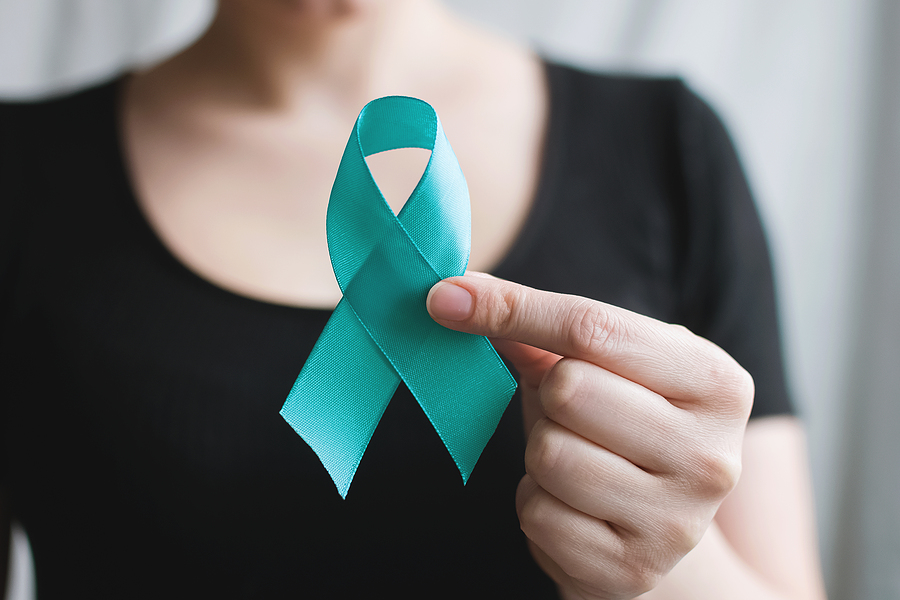March is Ovarian Cancer Awareness Month
The earlier a woman is diagnosed with ovarian cancer the more likely she will respond to treatment. But most women are diagnosed once the disease has already spread. This Ovarian Cancer Awareness Month, we can make sure that more women are diagnosed earlier.
Early diagnosis saves lives; women over the age of 50 who have already gone through the menopause are most at risk of the disease, yet too many of us don’t understand or recognise the symptoms of this very treatable cancer.
About Ovarian Cancer
7,000 women in the UK are diagnosed with ovarian cancer every year, making it the fifth most common cancer among women. Ovarian cancer can affect women of any age, but it is most commonly diagnosed in women over 50 who have been through the menopause.
The survival rate for women diagnosed with ovarian cancer at an advanced stage is just 46 per cent – but when diagnosed at the earliest stage, her chance of surviving ovarian cancer for five years or more doubles to more than 90 per cent.
Symptoms of Ovarian Cancer
Early indicators of ovarian cancer can be confused with symptoms of other conditions and as a result often go ignored. However there are definite symptoms of the disease, and we now know that ovarian cancer is not the ‘silent’ disease it was once thought to be. If you experience any of the symptoms speak to your GP – it’s better to be safe and check than ignore it.
Symptoms can include:
- Persistent bloating and a feeling of fullness in the abdomen
- Pain in the lower stomach and pelvis
- Difficulty eating
- Needing to urinate more often than normal
People with ovarian cancer can experience the above symptoms quite suddenly and find they are severe and last most days for a few weeks.
Causes, Screening, and Treatment
The exact cause of ovarian cancer is not known. Although women over 50 are more at risk of the disease, younger women can develop ovarian cancer too.
Ovarian cancer is not associated with sexual activity or the HPV virus, and the cervical screening test (smear test) cannot detect ovarian cancer.
If you have had two or more close relatives (on the same side of the family) who have been diagnosed with breast or ovarian cancer then you may have a slightly increased risk of developing the disease. However only 20% of ovarian cancer cases are thought to be linked to faulty genes.
There are some other factors which are thought to slightly increase the likelihood of developing the condition. These include: if you started periods when you were very young or if they ended later; if you are obese; if you’ve used HRT for more than five years; if you smoke; if you use talcum powder between the legs.
If you have symptoms and are in an at risk group, you should make an appointment to see your GP. GPs arrange several different tests to screen patients with symptoms of ovarian cancer. These include a physical exam, a blood test, and a CT scan.
Ovarian cancer is usually treated with a combination of surgery and chemotherapy, depending on the stage of the cancer and your own health.
Ovarian Cancer Awareness Month
Ovarian Cancer Awareness Month hopes to raise the profile of the disease and highlight the symptoms of ovarian cancer to make it easier for women to recognise through its Start Making Noise campaign.
Too many women understand the symptoms of ovarian cancer too late; this March the charity Target Ovarian Cancer is encouraging people to inform themselves about ovarian cancer and share their knowledge with others so more women can get diagnosed sooner.
Were you aware of the symptoms of ovarian cancer?
Rachel - Silversurfers Assistant Editor
Latest posts by Rachel - Silversurfers Assistant Editor (see all)
- The best of Liza Minnelli - March 11, 2025
- Shrove Tuesday traditions - March 3, 2025
- Sweet & Savoury Pancakes for Shrove Tuesday - March 1, 2025
- 5 romantic films to revisit this Valentine’s Day - February 12, 2025
- Living with tinnitus: an online guide - February 4, 2025





















